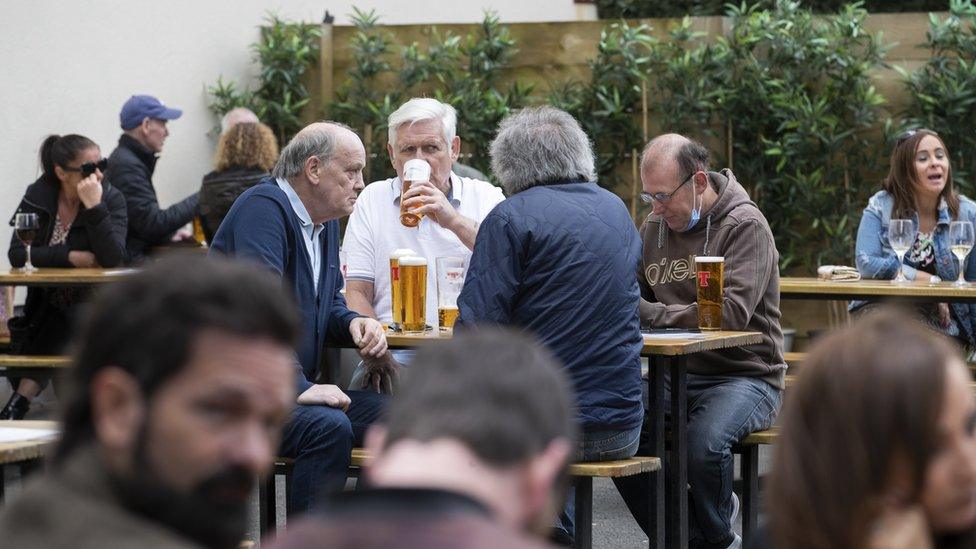Covid in Scotland: How amateur musicians have adapted
- Published
Covid in Scotland: How have amateur musicians adapted to life in a pandemic
Before Covid-19, thousands of people across Scotland would spend their spare time performing with amateur music groups.
Like so many other activities, that was brought to a halt by the pandemic in March.
With a limited Proms taking place and Scottish Opera and the RSNO performing again, professional musicians are now taking small steps forward. But what has life been like for the amateur performers?
The brass band

Whitburn Band has been the Scottish brass band champion 20 times
"You are as close to the people at band as you are to your family," says Charlie Farren.
"To not be with them, it is incredibly difficult."
Charlie is the chairman of Whitburn Band, one of Scotland's top brass bands. This year marks its 150th anniversary.
Covid restrictions means Charlie is not playing with bands for the first time in 40 years.
"We had a massive schedule planned for the entire year. Overnight, it was all gone and it cost the band thousands of pounds."
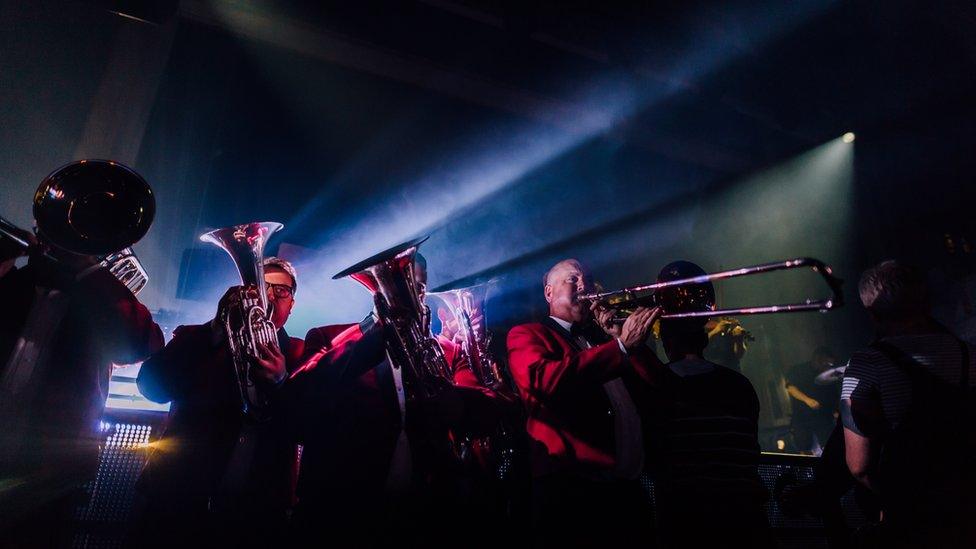
Whitburn Band, pictured here performing at the Edinburgh International Festival in 2018, returned to the event in 2019
An estimated 2,500 people play with brass bands in Scotland. I am one of them, as a member of the Whitburn Band.
In recent years, we have performed at the Edinburgh International Festival and Celtic Connections and millions have heard the band play the national anthems at Scotland's rugby internationals.
With all events cancelled, Whitburn has turned to virtual performances. These have attracted more than 127,000 views and raised more than £1,200 for West Lothian Foodbank.
The band has also received help through a grant from the Scottish government, part of a package of financial support available to the creative sector.
Current restrictions for non-professional musicians mean that - with one specific exception - a maximum of six people from two households can play or sing together outdoors.
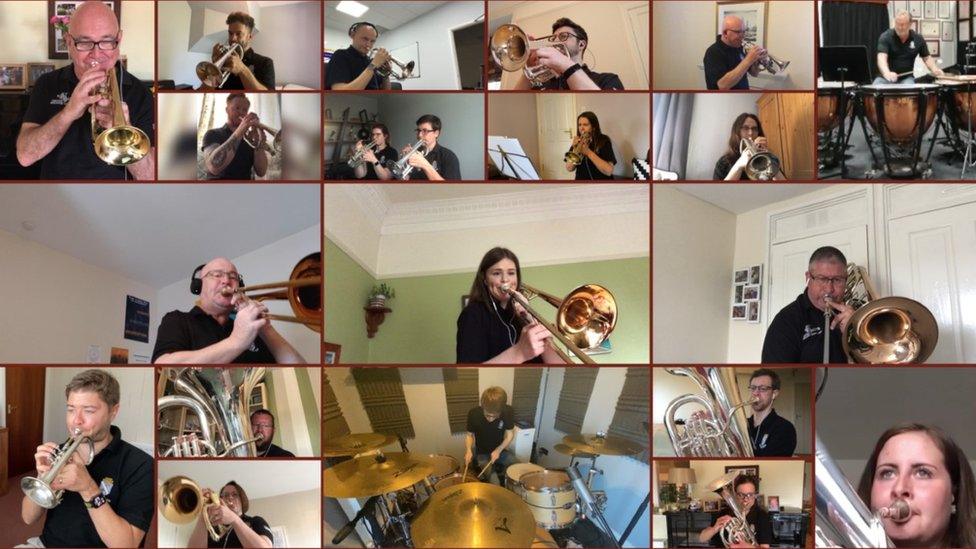
Whitburn has published nine virtual performances during lockdown
The challenges facing larger ensembles is stark.
Whitburn has 30 playing members from almost as many households. All the rehearsals and most of the engagements take place indoors.
Another barrier is a concern that playing a wind instrument or singing could spread Covid-19 via "aerosol and droplets" if a performer was close to others - an issue which has severely disrupted some music teaching in schools.
Charlie said he would like Scotland's brass bands to be treated the same as professionals - who can play indoors and outdoors with mitigating measures.
He fears that if things don't change in the near future, some will not emerge from Covid.
The folk band
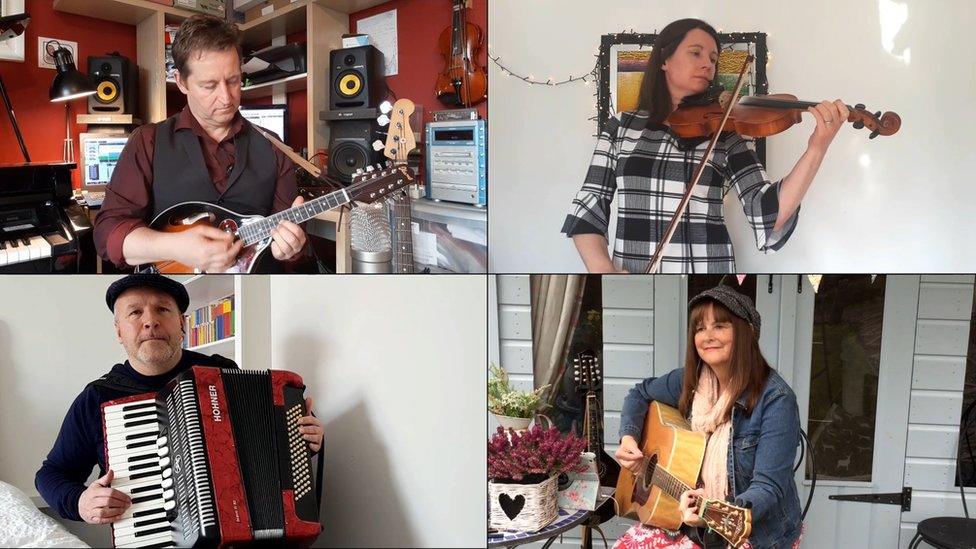
Folky MacFolk Face's performance of the Fisherman's Blues has had over 60,000 views online
Folky MacFolk Face was formed in 2016 after an impromptu performance at Jackie Mullen's home. Since then, the band has performed at Celtic Connections and on STV.
The four-piece group did meet up and play together when lockdown eased as they come from three households and don't have to sing.
But with the restrictions on households returning, the band are back to waiting again.
2020 was supposed to be a monumental year for the group - the first time Folky would have played abroad, in Galicia and China.
"Lockdown was a real disappointment," said Jackie. "But we decided we would try and make lemonade out the lemons and we had to do something."
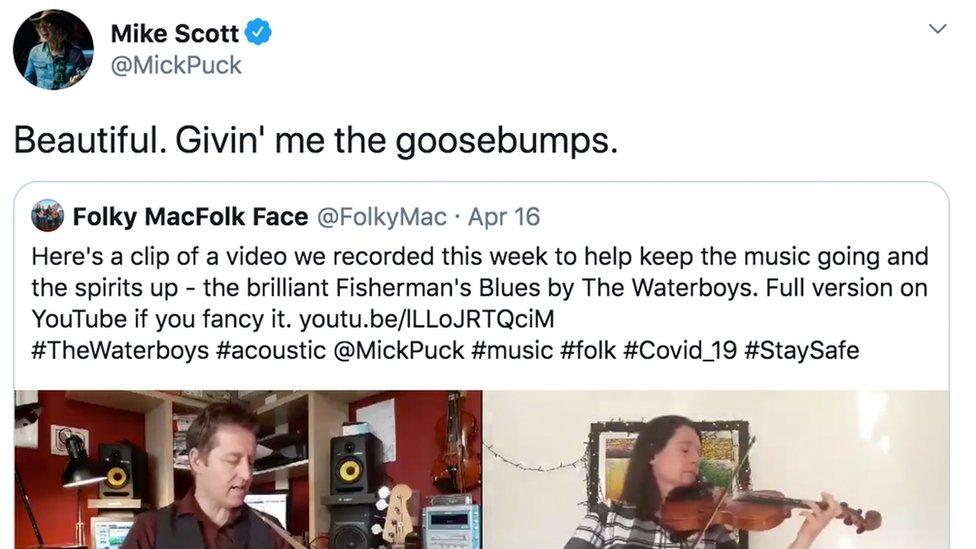
Mike Scott shared a performance by Folky MacFolk Face
Their online version of Fisherman's Blues by The Waterboys was shared by Mike Scott himself, giving Folky many new fans.
Jackie added: "Lockdown gave us an opportunity to do something that we might not have done.
"It has had its positives. It has been challenging, certainly for musicians, but we have tried to make the best out of it."
The band is now keenly awaiting the time when restrictions on meeting other households can be eased once more.
The choir
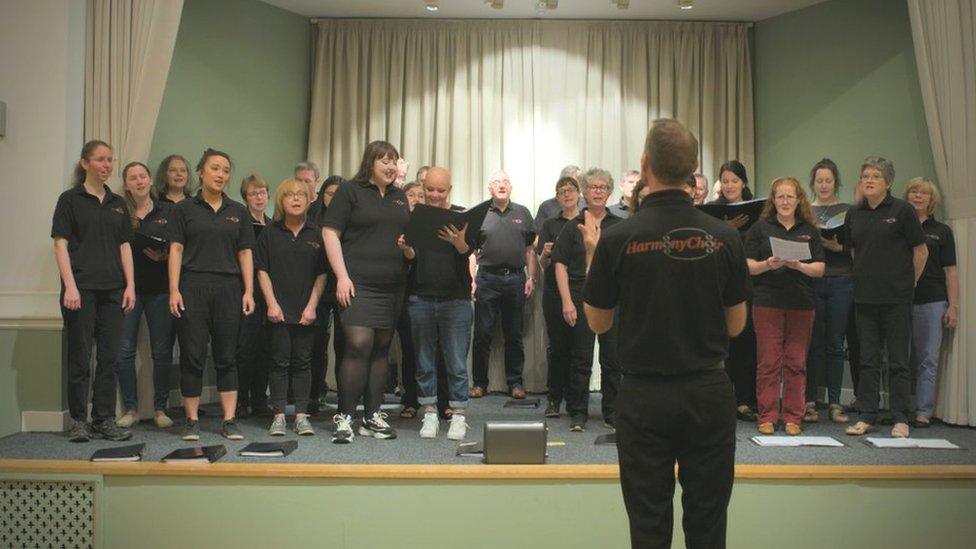
The Harmony Choir and Gail Porter (front row fifth from left) in action
The Harmony Choir in Edinburgh started out in 2016 as part of a University of Edinburgh project to study the effects of choirs on mental health.
Since then, it has appeared at the Edinburgh Festival Fringe, charity fundraisers and in a BBC documentary about Gail Porter and the TV presenter's own mental health.
Choirs are part of communities all over Scotland. They usually attract a large membership, with some having more than 70 singers.
The Harmony Choir has about 40 singers.
Musical director Ben Jones says: "I think the choir has helped people enormously. It has gone from being something they had never considered doing to something that is the centrepiece of their lives.
"It gives them focus. It gives them companionship."

The Harmony Choir has continued rehearsing online
The end of face-to-face rehearsals came quickly as the virus spread in the spring.
At one session there was hand sanitiser. By the next, lockdown.
"We figured out what we could do, and couldn't do, and we started to focus on what we could do together," sys Ben.
Harmony continue to rehearse together, over Zoom, every Monday night and have also released some online performances.
Like other large ensembles, they face a potentially long wait before a return.
Ben accepts that they have to "grin and bear it" as Scotland deals with this unprecedented challenge - but he is hopeful.
"Choirs have been going for millennia, and there have been pandemics before," he said.
"We will get through this."
Light at the end of the tunnel?
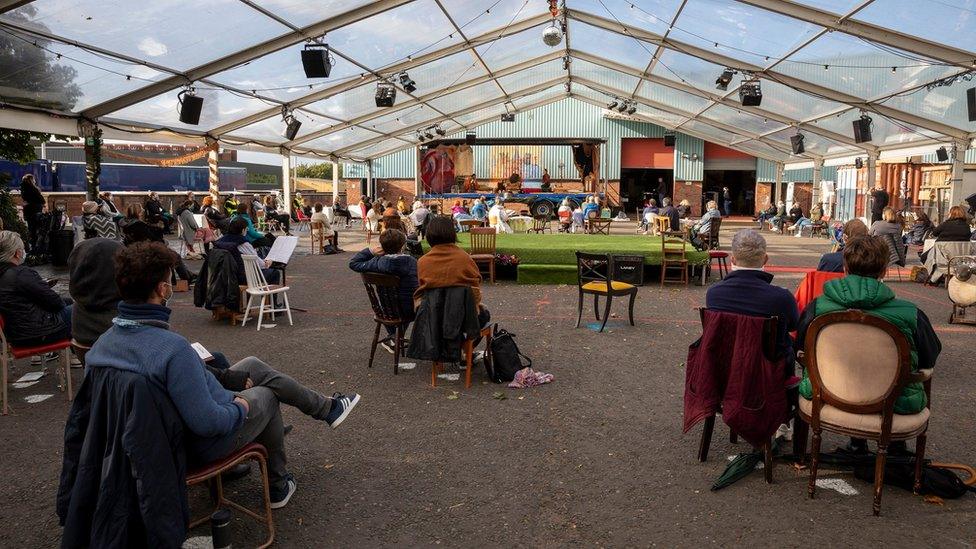
Scottish Opera has been able to stage socially distant performances
In the last week, the Scottish government updated guidance for performers, external that was originally published on 24 August.
In it, they state non-professional musicians participating in an outdoor activity organised by a business or charity can play or sing with mitigating measures in place, with the organisers liable for keeping everyone safe.
The government clarified to BBC News that the musicians would not have to adhere to the two-household rule if this organised outdoor activity was a socially distanced seated event, followed Covid guidance on events and performing arts, and didn't take place in hospitality areas such as beer gardens.
Ensembles - both large and small - could therefore perform outdoors in this very specific context.
With cases rising, and further lockdown restrictions recently imposed across Scotland, it remains to be seen if this outdoor event exception will make any practical difference for the majority of non-professional musicians at this stage.
It also remains to be seen if it means - even in a limited capacity - that the show can go on for some.

BACK TO SCHOOL: Can a school insist on a Covid test?
LOCKDOWN EASING: What changes next - and when?

- Published18 July 2020
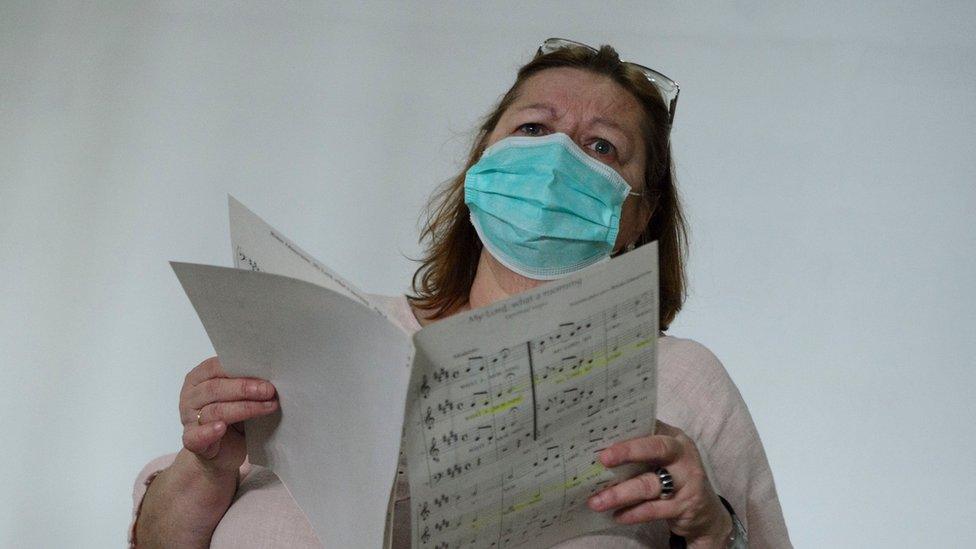
- Published11 August 2020
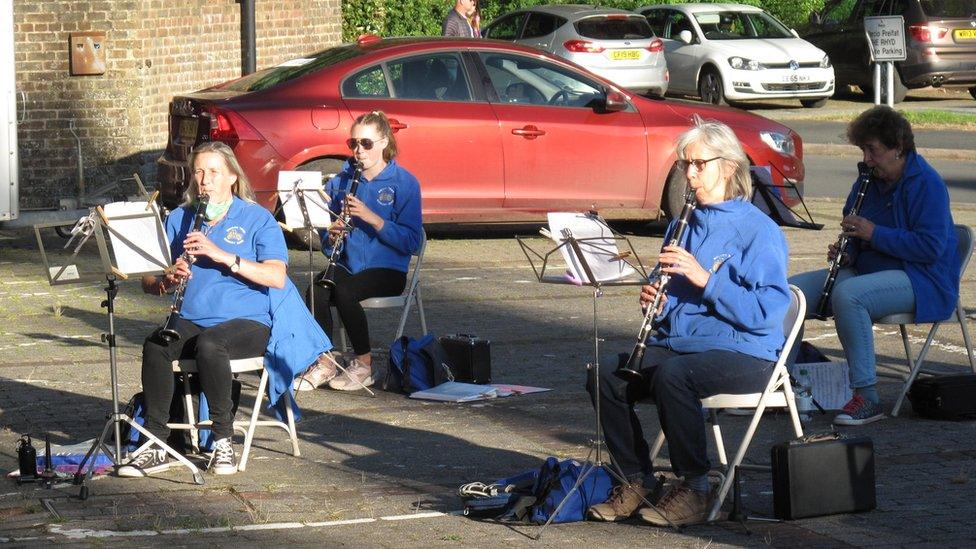
- Published4 September 2020
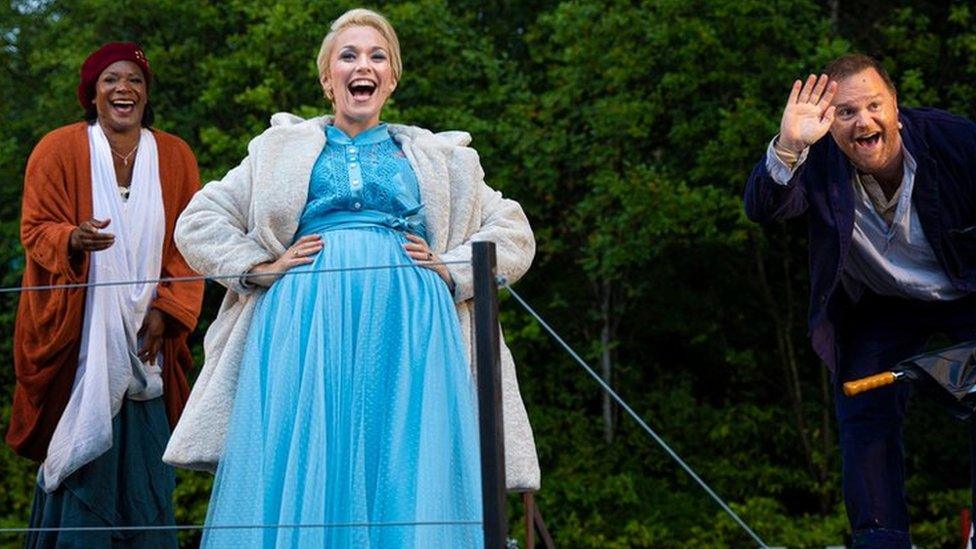
- Published10 September 2020
